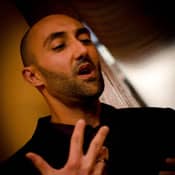With the relief that the alleged perpetrators behind the horrific Boston Marathon bombings have been neutralized comes an intense search for one simple question: Why? Why would Tamerlan and Dzhokhar Tsarnaev, refugees from a war-torn land, suddenly become blood-thirsty terrorists who attack the very country that took them in?
Theories abound. An initial report indicated that the two men's "religious beliefs" motivated them to attack innocent spectators at the marathon. It turns out, however, that this is wrong. Now, officials indicate that the wars in Iraq and Afghanistan are the main motivators. Whatever the truth ends up to be, it is still barbaric and wrong (and completely un-Islamic) to kill innocent civilians out of anger for a country's foreign policy.
If you, as a citizen, are unhappy with your country's foreign policy, then become a policymaker yourself and change it for the better. Or elect other policymakers who have a better point of view. Or become politically active and try to motivate the grassroots to change the policy. Or run for office and work to change the policy that way. Or stage a protest. Take to social media. There are many ways to voice your opinion. You don't kill people out of anger for a policy. You just don't kill people.
Having said that, the speculation that religion may have motivated the brothers to commit their terrible crime leaves me speechless. In fact, a long front-page article in the Wall Street Journaldetailed how the older brother, Tamerlan Tsarnaev, became increasingly "devout" before the terrorist attacks. This increased "religious zeal," goes the strange logic, led to his becoming a violent terrorist.
As it stands right now, the facts don't bear this out. The whole concept of increased Islamic religious devotion leading to violent extremism simply does not make any sense. To the barbarian extremists it does; to the Islamophobes it does also. But, to everyone else, it simply does not add up.
If someone becomes more religious, if someone becomes closer to God, it should make him—if anything at all—more peaceful and loving, not more violent. If increased Islamic religious practice—such as refraining from drinking alcohol or eating pork, praying five times daily, fasting during Ramadan, etc.—is a sign of an increased connection with the Lord, then the last thing one should become is a murderous terrorist.
That is because, when someone is sincerely religious and truly closer to God, he or she should want to take on the characteristics of the Lord. And, the prime characteristic of God in Islam is mercy. Before 99 percent of the chapters of the Quran comes this phrase: "In the Name of God, the Compassionate and Infinitely Merciful."
In the Quran, it says:
Say: "Unto whom belongs all that is in the heavens and on earth?" Say: "Unto God, who has willed upon Himself the law of grace and mercy. He will assuredly gather you all together on the Day of Resurrection, [the coming of] which is beyond all doubt: yet those who have squandered their own selves—it is they who refuse to believe [in Him]." (6:12)
The Prophet Muhammad (peace and blessings be upon him) once said: "When God completed the creation, He wrote in His Book which is with Him on His Throne, 'My Mercy overpowers My Anger. (Bukhari)'" The Prophet (pbuh) also said: "Be merciful to those on earth, and The One Who is in the Heavens will be merciful upon you."
If someone is sincerely religious, he should see himself as part of the human family and should work to help humanity—all of humanity—for the better. He should embody the verse of the Quran that says: "You are the best nation brought forth for humanity: you enjoin what is good, forbid what is evil, and believe in God." (3:110) In no way, shape, or form does senselessly taking innocent life qualify as "enjoining good and forbidding evil."
How can someone, who is truly religious and devoted to God, kill innocent people when God clearly says:
Say: "Come, let me convey unto you what God has [really] forbidden to you: 'Do not ascribe divinity, in any way, to aught beside Him; and [do not offend against but, rather,] do good unto your parents; and do not kill your children for fear of poverty—[for] it is We who shall provide sustenance for you as well as for them; and do not commit any shameful deeds, be they open or secret; and do not take any human being's life—[the life] which God has declared to be sacred—otherwise than in [the pursuit of] justice: this has He enjoined upon you so that you might use your reason.'" (6:151)





